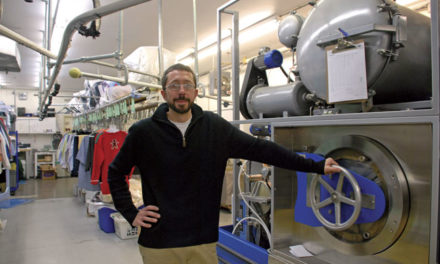
BY CAIRRIL MILLS
How do you raise awareness about a disease that’s socially unacceptable to discuss? With a purple dress, says Ashley Hasty, anything is possible.
Hasty, 27, a lecturer at Indiana University’s apparel merchandising and interior design department, was diagnosed in 2010 with Crohn’s disease, which is defined by webmd.com as a painful and incurable “chronic inflammatory disease of the intestines.”
The following year, Hasty founded the Purple Dress Project to raise awareness and funds to promote Crohn’s research. “I created the Purple Dress Project as my conversation starter for Crohn’s disease,” she says. “It’s tough to talk about the symptoms, it’s not glamorous, there’s nothing exciting about Crohn’s disease, and it’s just not socially acceptable to talk about your bowels.”
April is Crohn’s Awareness Month and purple is the color associated with the campaign, so in April 2011 Hasty wore the same purple dress every day. She asked family and friends for donations and raised $5,000 for the Crohn’s & Colitis Foundation of America (CCFA). But her main goal was to start a conversation.
“Wearing the same dress meant that people asked me why I was wearing it, so I could tell them about Crohn’s rather than having me say, ‘Let me tell you about Crohn’s disease,’ whether or not they cared.”
This year she collaborated with colleague Dr. Deborah Christiansen and ten student drapers to design ten purple dresses that were worn during April. The students needed to apply design considerations such as keeping the fit loose because people with Crohn’s disease tend to gain and lose weight as they “flare” or go into remission. Hasty and Christiansen plan to auction the dresses later this year to support CCFA.
Hasty hopes that raising awareness will get people talking about the disease. “Reach out to those who have Crohn’s disease and tell them you understand, that you care, that you empathize with what they’re going through,” she says. “It’s a very embarrassing disease, it’s a very isolating disease, and therefore those who have it tend not to want to talk about it. Telling someone with Crohn’s that you’ve read about it and are aware of it is really powerful.”







